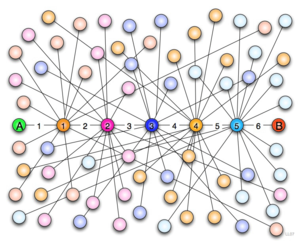
Time management matrix as described in Merrill and Covey 1994 book "First Things First," showing "quadrant two" items that are important but not urgent and so require greater attention for effective time management (Photo credit: Wikipedia)
Not too long ago, when my adult son mentioned how busy his work and life have become, my husband was reminded of an annual planning session he had attended at which a facilitator presented a workshop on how to organize your time.
As my husband drew a diagram from that workshop, I realized that he was drawing time management guru Stephen Covey‘s famous matrix.
Stephen Covey’s Matrix
Stephen Covey groups the ways we spend our time into four quadrants:
–1-important and urgent
–2-important and not urgent
–3-not important and urgent
–4-not important and not urgent
As my husband drew the diagram, he said, “The facilitator said you should attend immediately and with personal involvement to Quadrant I matters.” The facilitator’s words about urgent matters resonated with my husband because he always has more work than he can get done. Everything is urgent.
Everything is urgent
In your life, as an academic, ABD, dissertator, professional writer—does that sound familiar? You’re grading papers, attending meetings, preparing classes or presentations, returning email, managing crises at home, and trying to keep up with all that keeps hitting you. As you rush frantically and lose sleep, you also try to engage in last-minute binge writing of your dissertation before the time you told your advisor you would be submitting your promised work.
Not only had my husband remembered clearly what the facilitator said is assigned to Quadrant I– the urgent and important matters, but he also clearly remembered those matters in Quadrant IV. The facilitator said that Quadrant IV contains matters that you could basically forget about or things headed for the “circular file.” In other contexts, Quadrant IV could include behaviors such as vegging out in front of the TV or hanging out at Facebook.
So that’s Quadrant I and IV. What about Quadrant II? Important but NOT urgent matters would go in Quadrant II.
Not surprisingly, my husband said that had forgotten what the facilitator said specifically about Quadrants II. That’s probably because my husband, like so many of us, has to focus on urgent matters. The stuff that never stops.
What you need to meet your goals
What are the important matters contained in Quadrant II and why should we care? Take a look at what matters are in Quadrant II:
–goal-setting
–planning
–building relationships
–exercising
–productivity
People who most often meet their goals do more planning, organizing, and anticipating. They work efficiently and productively, avoiding last-minute sprints in order to meet impending deadlines, and they honor goals of a healthy lifestyle and close relationships.
While you might be able to avoid some of the distractions and time-wasters of Quadrants III and IV, how do you ignore the unrelenting onslaught of urgent demands of Quadrant I so that you can spend more time with the important matters of Quadrant II?
Controlling what’s urgent
Not everything is an emergency, and we can take steps to stay out-of-the-way of things that appear urgent. Whenever possible, avoid email, particularly before or during a writing session. Avoid such additions to your workload as more volunteering, carpooling, office projects when the work really isn’t your responsibility, and perfectionism that can lead to unwarranted revision and research on your writing project.
Let people know that you are turning off your email and phone during the time you are writing. That would be a bold, but empowering step, wouldn’t it?
10 tips that will move you closer to your writing goal
Here are more tips that will help you increase your focus on what is important and also help you move closer to your writing goal:
–Anticipate future demands and activities. Plan, plan, plan.
–Make your schedule and stick to it.
–Plan do-able, timely deadlines which you meet. Such a plan results in productivity.
–Prepare so that when you sit down to write, your subconscious has had time to work on the ideas.
–Include physical exercise in your life. (Check out previous blogs and upcoming blogs on the importance of exercise to your writing life.)
–Break out the outlines. If you don’t have an outline, make one. Have an outline in place to guide your writing session.
–Routinely, daily, go to a quiet place to write and to plan the next day’s writing.
–Set up an accountability factor. Ask your friends if you can mail them a chapter and then tell them when you will mail it.
–Email your coach with frequent updates on daily writing sessions.
–Keep an eye on productivity—it’s under your control.
It might be a small problem for you to push aside something seemingly urgent in order to plan and schedule writing sessions, but if you don’t do that, you’ll have the big problem of not producing text because you are running around as if your hair is on fire.
Your hair isn’t on fire. Slow down, plan, and show up to write.
In the March issue of my newsletter Smart Tips for Writers, I wrote about Stephen Covey’s “Big Rocks” and how that strategy relates to your dissertation. Let me know if that issue never arrived in your inbox. If you aren’t signed up for my newsletter, you can take care of that at my website at www.nancywhichard.com.
I’d love to hear your ideas on urgent vs. important matters and how they impact your writing.
Best to you,
Nancy
Nancy Whichard, Ph.D., PCC Your International Dissertation Coach and Academic Career Coach www.smarttipsforwriters.com www.dissertationbootcamp.net www.nancywhichard.com nancy @ nancywhichard.com


